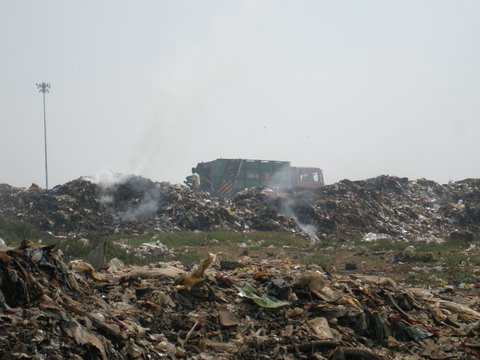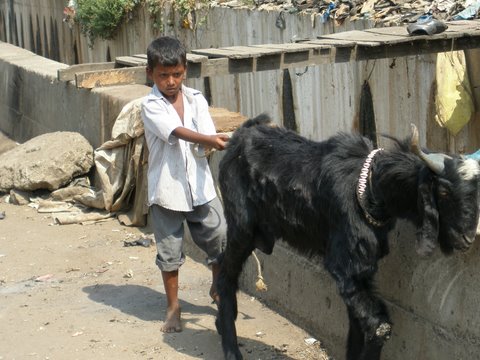 Mountains of garbage dump in New Delhi, the capital of India. A slum dwelling in the backdrop of sky scrappers in Mumbai, the industrial capital of India. Not matter where you go, the other side of the India reality stares you in the face. Children playing in what is a black mountain of garbage. These are the children of the Rag pickers. And this is a very common sight in major cities in India. India lives in many centuries at the same time.
Mountains of garbage dump in New Delhi, the capital of India. A slum dwelling in the backdrop of sky scrappers in Mumbai, the industrial capital of India. Not matter where you go, the other side of the India reality stares you in the face. Children playing in what is a black mountain of garbage. These are the children of the Rag pickers. And this is a very common sight in major cities in India. India lives in many centuries at the same time.
Slums are everywhere in Indian cities and they stare you in your face. The sprawling shantytowns, with dwellings made of polythene sheets, cardboards, rags, tin, mud, occasionally bricks and practically anything that can be used in putting up a shelter from sun and rain, can be seen along the railway lines, along the boundary walls of factories and offices, along roads, in the river beds, along the open canals and large drains that carry the city waste, on any piece of vacant land often belonging to the municipality or to other public institutions.
These are slums home to the migrant laborers. Large scale livelihood based forced migration has been on ascendance in India over the last couple of decades and it will be a major phenomena to contend with even in the future. Since the economic liberalization in 1991, India is on a path of accelerated capitalist growth, which results in people flocking cities in hope of livelihood and better lives. The old Indian agragarian system is becoming obsolete and young people are migrating to big cities to earn a living and in hope to improve the quality of life for themselves and their families. The “Indian Dream” or the Indian version of the “American Dream”.
Recent decades have witnessed rapid urbanization all over India. During the period 1991-2001 the overall urban population growth rate has been 31 per cent. In comparison, the overall population growth during the same period has been 21 per cent, and the growth rate of the rural population has been 18 per cent. Large urban agglomerations have gone through particularly explosive growth. Largest 35 among these now account for 11 per cent of the total Indian population.
You may ask who are these Rag Pickers, what are their stories and why should we help them?
Rag pickers are the people who scavenge through the colossal waste the city produces every day. This trash comes from homes, offices, small businesses, factories, shops and almost every other activity that a city engages in. Garbage dumps are often out in the open, by the roadside. Since the mechanized facilities for separating recyclable material out of this waste are almost non-existent, this task is accomplished manually by the waste pickers. They collect recyclable waste and trash from various places in the cities including plastic bags, plastic bottles, glass bottles, metal scraps, used bulbs and fluorescent tube lights, rejected vegetables, fruits and kitchen waste, old medicines, paints, chemicals, containers of different chemical products of factories, batteries, clothes and other objects soiled with bodily fluids like excreta and vomit. They even pick things from dumps of hospital waste. They collect anything that has a resale value or can be recycled. They have no protection gear on them while doing all this hazardous work. Their nose and mouth are not covered; they use their bare hands and walk in such dumps with bare foot. Even basic needs like facemasks, gloves, sticks and boots are unavailable to these workers who engage in an extremely hazardous profession. 
There are no exact data available on how many rag pickers are there in India. Some reports suggest between approximately 2 to 2.5 million people engage in this profession, with over 300,000 in Delhi alone. The living conditions in the slums are inhumane to say the least. The waste pickers in Delhi are responsible for saving the government up to 6 lakh (600,000) rupees (12,000 USD) per day. Despite this, their work is not officially recognized or protected, and they undergo regular harassment at the hands of public officials and civilians alike. Their lack of recognition also prevents them from public benefits such as social security or healthcare coverage, and puts them at the constant mercy of private recycling companies.
It is in this backdrop that ACORN India is engaged in the process of building a membership base amongst the waste pickers so that they can secure protections to their livelihoods and persons.
ACORN India has won small yet significant victories that ensure better working conditions for these rag pickers. The rag pickers associated with ACORN India are now provided with masks to cover their faces, gloves and boots and sticks to scavenge through the garbage. ACORN India recently started organizing in the Dharavi squatter community in Mumbai. Dharavi is Asia’s largest slum where some of the largest recycling units of Mumbai are located. ACORN India has recently embarked upon two campaigns in Mumbai called the Dharavi Project and Waste Matters. The main goal of the initiave is to raise awareness about the plights of rag pickers and to generate funds to work towards the redressal. As part of the Dharavi Project, a documentary will be filmed which will be distributed in four languages in schools and colleges. One of Bollywood’s (Indian film industry’s) top music trio will do a music video for ACORN India about its work among the Rag pickers. The trio will also do a show in Mumbai on January 13th, 2009, the proceeds of which will go towards setting up an organization for the Rag pickers. The Dharavi project will bring in artists, school students and architecture students in direct interaction with the rag picker community.
Almost 35 percent of India’s population still lives on less than a dollar a day. Developing economies like India are emerging as the next frontiers of market expansion. The onslaught of mindless corporatism results in denial of basic rights like water, sanitation, education and health, right to land and a life free of evictions, and basic human dignity. It is in face of such big challenges that ACORN India is looking to mobilize these vulnerable communities to fight for their basic rights and in process empower themselves.